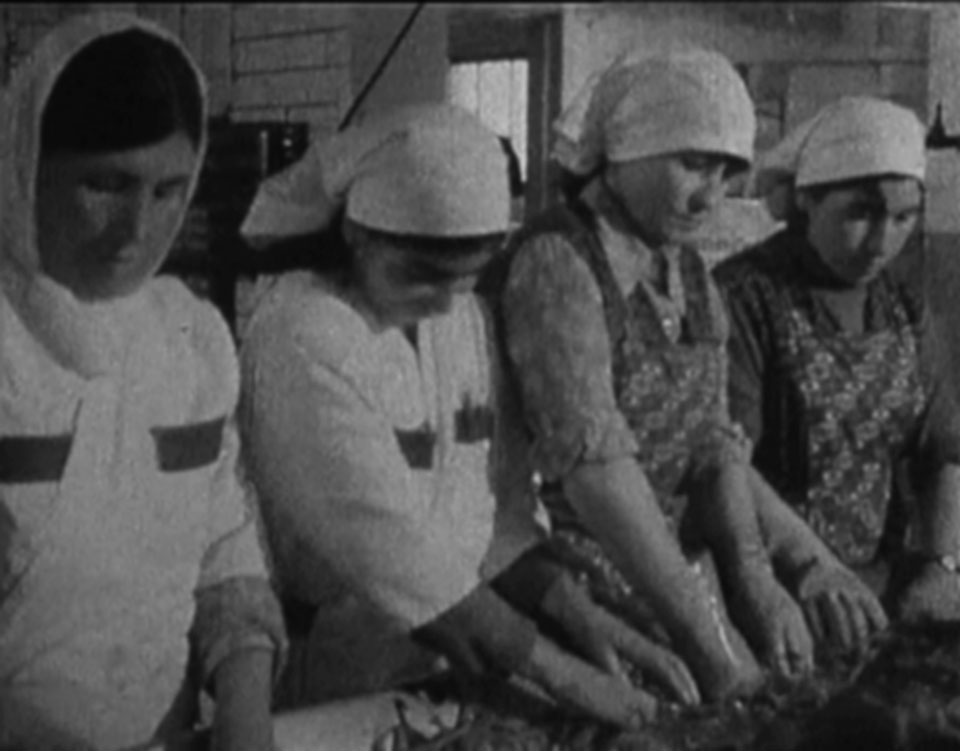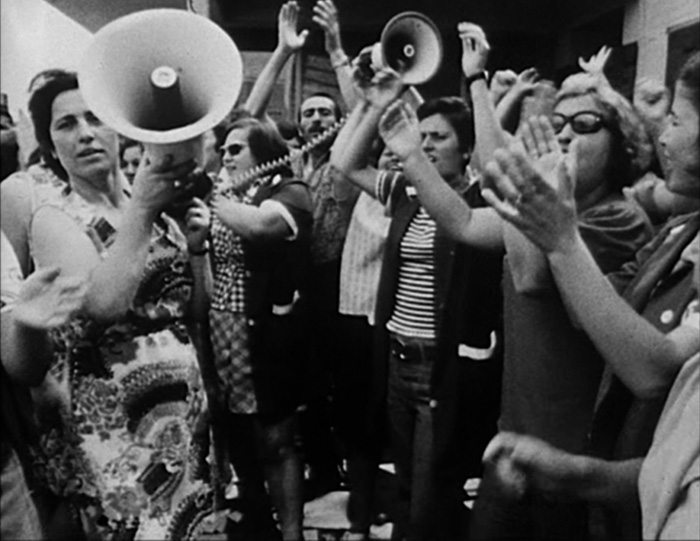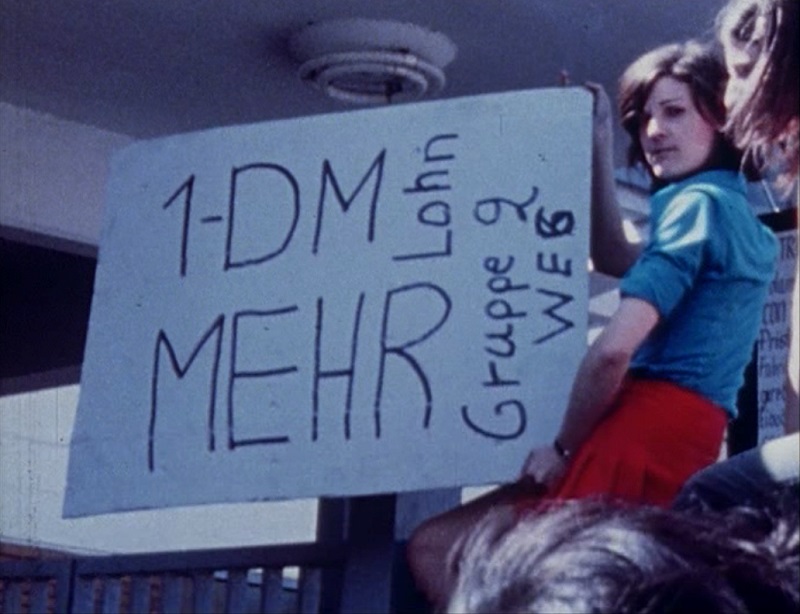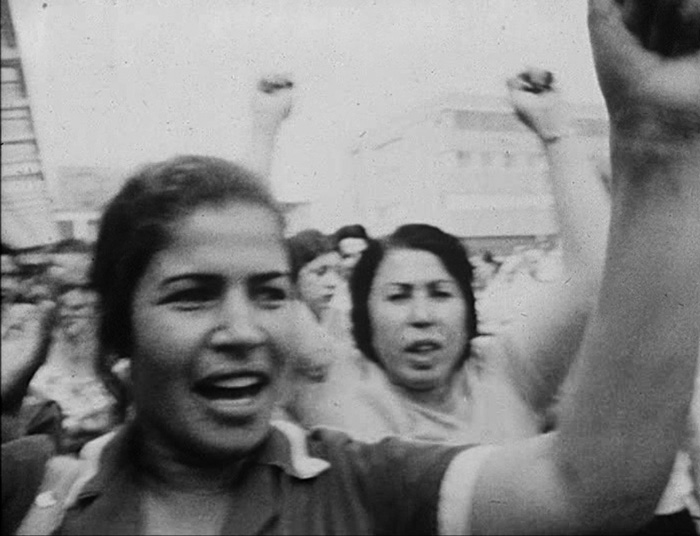FRG 1969 | Director: Edith Marcello (former Schmidt) | Camera: Bernhard Weber | Editor: Gisela Grafe | Sound: Dietrich Köpke | Production: Hessischer Rundfunk (hr) | b/w | digital | 30 min | german, turkish OV | hr
The off-screen speaker's voice explains the situation of Ms Karatan from Turkey: "She came to a glassworks in July, with a one-year contract at an hourly wage of 2.30 marks." Just a few months later, Ms Karatan's living and working conditions will prove untenable. The work is dangerous, and she experiences racist attacks in the factory. Now she's taking legal action against the company, and if she loses, she could be deported. Ms Karatan is accompanied by her little nephew, who translates Edith Marcello's questions: apparently, broadcaster Hessischer Rundfunk was unable to provide professional Turkish interpreters in 1969. This presents a hurdle, not least because BILLIGE HÄNDE takes the opening question "What do we know about them?" – the workers – seriously.
A Greek trade unionist, an Italian priest, and young Günter Wallraff place individual fates in the context of West Germany's immigration policy. The shocking conditions are part of a system. And yet Marcello finds moments of solidarity in her half-hour HR report: a wildcat strike among Spanish women workers in Hanover; the founding of an Italian school by women workers in Frankfurt. (Patrick Kokoszynski, 2023)

| Acronyms | |
|---|---|
| amer. | American English |
| b/w | Black and white |
| OV | Original version |
| SUB | Subtitles |
| +SUB | electronic live subtitling (below the image) |
| INT | Intertitles |
| Countries | |
|---|---|
| AT | Austria |
| FRG | Federal Republic of Germany (historic) |
| BLR | Belarus |
| DE | Germany |
| CAN | Canada |
| GDR | German Democratic Republic (historic) |
| EGY | Egypt |
| FR | France |
| GB | Great Britain |
| URY | Uruguay |
| BRA | Brasil |
| SWE | Sweden |
| UKR | Ukraine |
| PL | Poland |
| IDN | Indonesia |
| PRT | Portugal |
| HRV | Croatia |
| ECU | Ecuador |
| HUN | Hungary |
| AUS | Australia |
| IT | Italy |
| MEX | Mexico |
| IND | India |
BRD 1974/75 | Director: Edith Marcello, David Wittenberg | Editor, Production: Edith Marcello | Photographs: Peter Leipziger | Colour & b/w | DCP of DVD | 49 min | german OV
Someone wonders off-screen whether serfs still exist in Pierburg: the speaker expresses solidarity with the strike, as does IHR KAMPF IST UNSER KAMPF as a whole. Employees and committed filmmakers recorded the events at the Alfred Pierburg company in August 1973 on Super 8 and 16 mm cameras. For one week, female workers demonstrated for the elimination of a low-wage category that applied only to women, and against wage discrimination in general. At the time, the women earned DM 4.70 an hour. [...] Of a total of 3,800 employees, approximately seventy per cent were migrant labourers, and most of those were women. They demanded equal pay of women and men for equal work, and one more mark per hour for all. They also supported better working conditions overall. In the film, the wokers describe their miserable living conditions in company-owned housing. Little by little, the women gained the complete support of their German (and) male colleagues. The Pierburg strike is legendary because it was initiated primarily by women migrant labourers and because it was successful: for the first time, Pierburg abolished the low-wage category, and they never reinstated it. No one was fired, and the collective bargaining policies of unions were even called into question.
PIERBURG – IHR KAMPF IST UNSER KAMPF [...] was made in close consultation with the strikers and was produced as a promotional tool for, and with, the workforce and the works council. It was conceived primarily to serve as a discussion point for events and intended to connect companies nationwide on a grass-roots basis. Though it was never broadcast on TV, it did play at numerous solidarity events. (Freiraum Neuss e.V.)



| Acronyms | |
|---|---|
| amer. | American English |
| b/w | Black and white |
| OV | Original version |
| SUB | Subtitles |
| +SUB | electronic live subtitling (below the image) |
| INT | Intertitles |
| Countries | |
|---|---|
| AT | Austria |
| FRG | Federal Republic of Germany (historic) |
| BLR | Belarus |
| DE | Germany |
| CAN | Canada |
| GDR | German Democratic Republic (historic) |
| EGY | Egypt |
| FR | France |
| GB | Great Britain |
| URY | Uruguay |
| BRA | Brasil |
| SWE | Sweden |
| UKR | Ukraine |
| PL | Poland |
| IDN | Indonesia |
| PRT | Portugal |
| HRV | Croatia |
| ECU | Ecuador |
| HUN | Hungary |
| AUS | Australia |
| IT | Italy |
| MEX | Mexico |
| IND | India |






